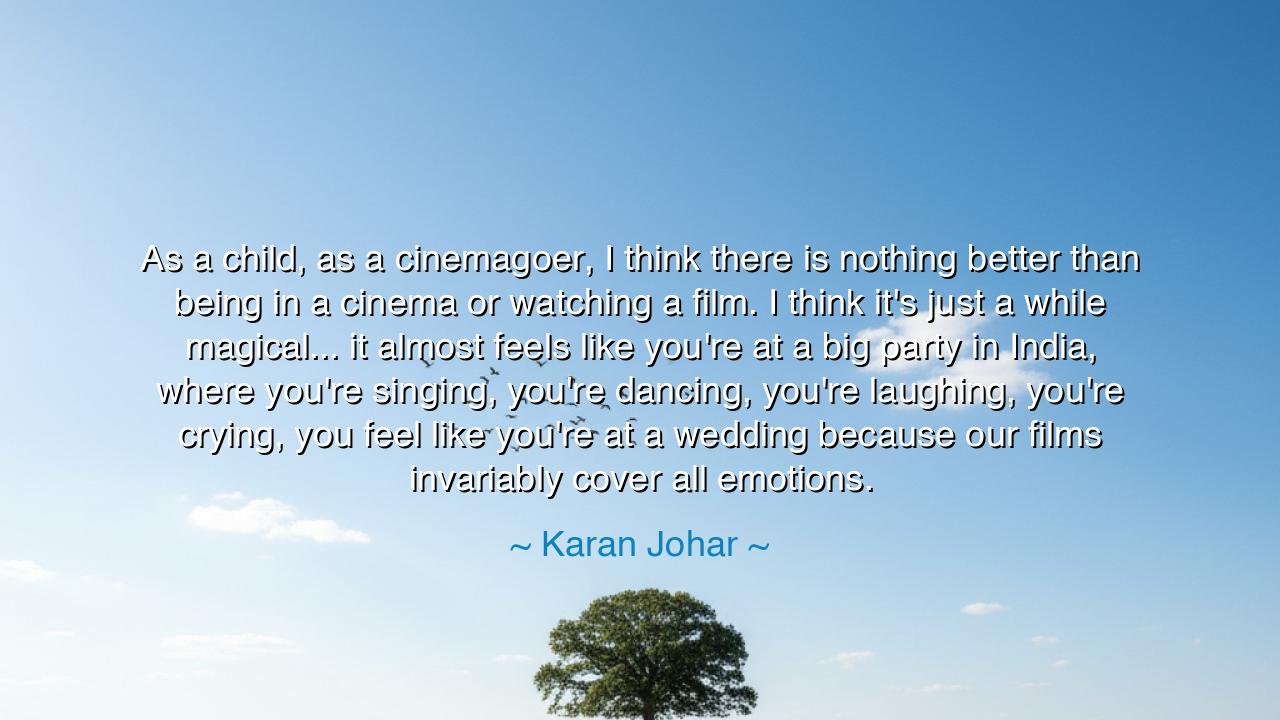
As a child, as a cinemagoer, I think there is nothing better
As a child, as a cinemagoer, I think there is nothing better than being in a cinema or watching a film. I think it's just a while magical... it almost feels like you're at a big party in India, where you're singing, you're dancing, you're laughing, you're crying, you feel like you're at a wedding because our films invariably cover all emotions.






In the words of Karan Johar, we find a vision of cinema not as entertainment alone, but as life magnified: “As a child, as a cinemagoer, I think there is nothing better than being in a cinema or watching a film. I think it's just a while magical... it almost feels like you're at a big party in India, where you're singing, you're dancing, you're laughing, you're crying, you feel like you're at a wedding because our films invariably cover all emotions.” Here he declares that the cinema is a temple of feeling, where the heart is led through every season of human experience.
To him, the great Indian wedding is the perfect metaphor, for such a gathering contains every shade of existence: joy and sorrow, music and silence, grandeur and intimacy. In the same way, Indian films, filled with dance, drama, and passion, seek to embrace the entirety of life, leaving no emotion untouched. This is why the audience leaves not with one mood, but with the sense of having lived many lifetimes within a few hours.
History shows us the same impulse in the festivals of ancient Greece, where tragedies and comedies were performed together. The people gathered not simply to watch but to feel—to weep with Oedipus, to laugh with Aristophanes, to be purged, renewed, and reminded of their humanity. Just as the Greeks saw theatre as a civic duty, so Johar reveals the Indian heart sees film as a communal feast, as essential as weddings and festivals themselves.
The magic of cinema, as Johar describes, is that it is never solitary, even when one sits alone. The crowd breathes together, gasps together, laughs and cries together. It is the joy of shared experience, the same joy that binds families at a marriage ceremony, where hundreds may gather to witness the union of two, yet leave feeling united as one. Cinema, like the wedding, is a celebration of belonging, where the soul is reminded that it is part of something larger than itself.
So let this truth be passed to future generations: do not belittle art, for it is not escape but immersion into the fullness of life. When the screen glows and the story unfolds, you are not watching shadows—you are stepping into a sacred celebration, where the heart may sing, weep, and dance without shame. As Johar teaches, the greatest films are not those that flatter the mind, but those that embrace the whole of existence—turning every viewing into a wedding of emotions, where the soul itself is the honored guest.






AAdministratorAdministrator
Welcome, honored guests. Please leave a comment, we will respond soon